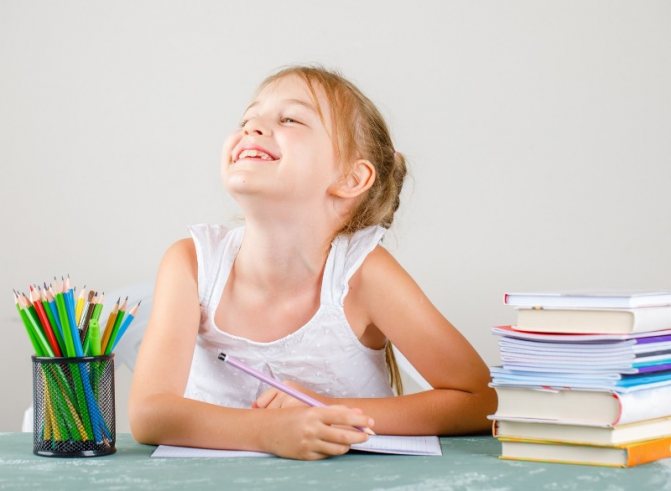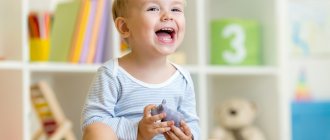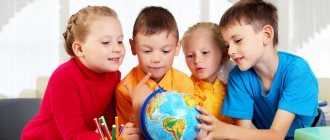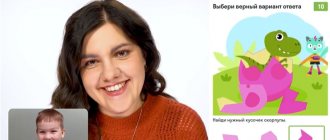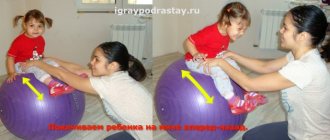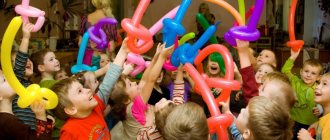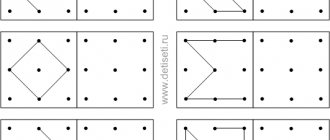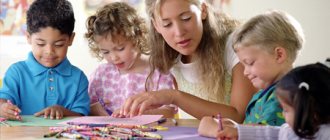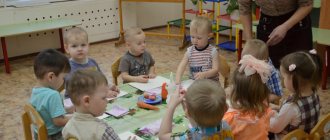Methodology for conducting classes to prepare for school in preschool educational institutions
To achieve the set goals and objectives, the teacher must not only wisely select the content of the lesson, but also logically build its structure.
Temporary GCD plan for school preparation
Like other classes with older preschoolers, the school preparation lesson lasts 25–30 minutes. This time frame includes 4 stages of work:
- Updating basic knowledge (introductory stage) - 2–3 minutes. The teacher motivates the children to work, the children repeat the material learned earlier, and check their homework if this type of work is expected.
- The main stage is up to 15 minutes. During this time, children become acquainted with new material, combining the information received with what they have already mastered. In addition, the main stage includes physical education (breathing exercises, finger games).
- Consolidation of what has been learned - up to 8 minutes. The studied material is systematized using practical techniques (making applications, drawings, etc.).
- The final stage is up to 4 minutes. The teacher comments on the work of the group as a whole and each child individually. Children evaluate themselves in class, that is, reflection is carried out.
An integrated lesson usually includes tasks in literacy, mathematics and environmental awareness.
Table: summary of the integrated educational activity “Back to school soon!” in the preparatory group (fragment)
| Author | Kharlanova I., teacher, kindergarten No. 10 "Bell", Kolomna, Moscow region. |
| Introductory stage | V.: Guys, let’s say hello to our guests and give them our smiles. Now everyone look at me and give me your smiles. Good morning, dear children and adults. This morning a package arrived to us, now we’ll see who it’s from (these children left our group for school a year ago). He opens the parcel and reads the letter: “Hello, dear friends! I'm doing well, I really like studying at school, I've made a lot of good friends. I try to study at “4” and “5”, and at school it is very important to be kind so that you have many friends. I know that you will also go to school soon, and therefore I have given you interesting tasks. When you complete them, a surprise awaits you. Good luck and success, see you soon." V.: I know that you want to go to school, but why? Children's answers...> |
| Main part | <… V.: Let’s see what the task is... You need to answer the questions with complete answers, are you ready?
Q: Let us remember what parts the task consists of? (From the condition and question).
V.: Well done! Let's create a problem based on the picture. Tell us your task. (Children's answers). <…> Do a graphic dictation:
V.: Let's see what's in the next envelope. You need to answer the questions:
|
| Consolidation of what has been learned | <… V.: Look: syllables are written on the envelopes. Let's try to make a word out of them. Children form the word “KINDNESS” and read it. Q: Guys, what do you think “kindness” is? <…> Children read poems about kindness and politeness. |
| The final stage | <… V.: Let us never forget kind, polite words. Let's say them to each other more often, speak kindly, gently, quietly, looking into the person's eyes. At the same time, smiling, because a smile makes a gloomy day brighter. A beautiful word that helps you live. All tasks have been completed. You handled everything well. What did you do today? (Children's answers). Look, we have another letter. “Well done! You did an excellent job with all the tasks and deserve a surprise. See you at school." The teacher gives the children medals - emoticons. V.: Thanks to our guests, teachers, thanks to our guys! |
| Quote from: https://www.maam.ru/detskijsad/konspekt-integrirovanoi-nod-na-temu-skoro-v-shkolu-v-podgotovitelnoi-grupe.html | |
Video: open integrated lesson in a preparatory school group
https://youtube.com/watch?v=YlOrFybQODI
Preparing for school is a long and systematic process that is carried out in kindergarten, starting from the first junior group. But if in primary and middle preschool age children master social and communication skills that are of key importance for the subsequent educational stage, then in older groups this work takes on the character of direct educational activity, that is, it is organized in special classes. As a rule, the teacher plans these lessons as integrated, that is, including work in all educational areas in accordance with the Federal State Educational Standard.
What is not recommended to do when preparing preschoolers
Some parents begin to actively engage with their child from the age of three. But at this age, the child is not yet diligent enough, and therefore learning the basics of reading and writing is a difficult task for him. It is better to invite your child to try himself in different sports or creativity. The baby will be able to choose what he liked best and start doing it. Attending such clubs and sections will make the child more responsible and organized.
But it is better to teach a child to read syllables from the age of five. The problem with teaching a preschool child at home is that parents often organize classes inconsistently and unsystematically, and are not based on curriculum.
Parents have to be patient, since the child cannot understand everything the first time. Under no circumstances should you scold a child for mistakes; they need to be sorted out with him. You cannot use ultimatums and threats in the learning process, since this will not bring a positive result in learning, but will cause persistent rejection of future school everyday life.
The load on the child should increase gradually. You can start with five tasks a day, gradually increasing their number. Try to praise your child for every correct step, because for him this is an achievement. Each new lesson should begin with a repetition of the material already studied. You should also try to give more tasks to complete independently, so that the child can cope with them without parental help.
A common mistake in homework is irrational allocation of time - the child is overloaded with information, forgetting about breaks and the need to change activities. All this affects the child’s well-being and the effectiveness of learning. To avoid these and other common mistakes, many parents prefer to send their children to preparatory courses rather than teach them themselves.
